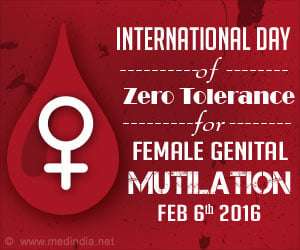- The United Nations has called to end to the brutal practice of female genital mutilation by 2030 through its Sustainable Development Goals published in 2015.
- The practice, which is mainly prevalent in some African countries, is demeaning, a health hazard, human rights violation and represents a gender inequality in the society.
- The practice can be tackled through awareness, disengagement from religion and culture, legal recourses and moreover, a change in mindset especially among men of the community.
The practice of female genital mutilation is not only demeaning to the female sex and an infringement to human rights, but is also often horribly painful, can cause health problems including bleeding, infection, infertility, mental consequences, and puts the life of an innocent at risk. Sex following the procedure does not generate any pleasure and is often associated with pain. Thus, one of the justifications often given for the procedure is that it will force girls and young women to remain virgins before their marriage, and improve their chances of finding a groom.
The practice is particularly followed in African countries of Somalia, Guinea, Djibouti, Gambia and Mauritania, and the Middle East, though it is widespread throughout the world including in Asia and the western countries in girls of all age groups, including infants.
The United Nations has called to put an end to the inhuman practice and provide care for its consequences through the establishment of the Joint Programme on Female Genital Mutation / Cutting in 2008. The initiative, however, cannot become a success until all stakeholders in the community take a joint decision to eliminate the practice.
Steps that can encourage the abandonment of the practice include the following:
- Increasing awareness about the false notions around the practice, and health and other consequences on the girl or woman in a well-coordinated manner. This process should involve governments, elders and respected individuals of the community, among others. Religious leaders can play an important role by informing people that the practice is not endorsed by any religious text. While young girls may not have much of a choice, awareness among women can play an important role in the elimination of the practice. A change in male perception towards the practice can speed up the process of eliminating it. If men from the communities that follow the practice express their willingness to marry women who have not undergone the procedure, many families will abandon it.
- Mere awareness however will not solve the issue. The communities should also be empowered to take steps against those who continue with the inhuman practice. Health care professionals who perform the procedure should be sensitized against it, by the rule of law if necessary. It is unfortunate that doctors, even in developed countries, are sometimes involved in doing the procedure, though there is no medical basis for it!
- Girls and women who have already undergone such procedures should receive medical help for corrective surgery and should be rehabilitated so that they can resume normal lives and find their place in society. Health care professionals should be trained to treat the patients with simple plastic surgery procedures.
- International Day of Zero Tolerance for Female Genital Mutilation, 6 February - (http://www.un.org/en/events/femalegenitalmutilationday/index.shtml)
- Female genital mutilation - (http://www.unfpa.org/female-genital-mutilation)









